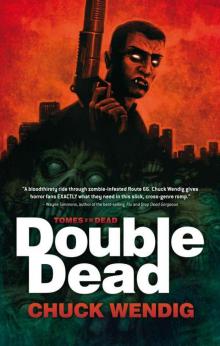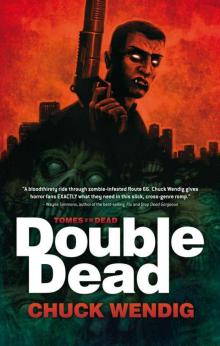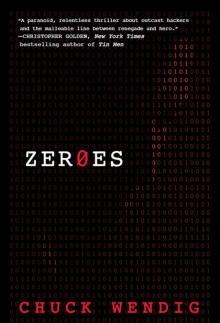- Home
- Chuck Wendig
Wanderers Page 17
Wanderers Read online
Page 17
“Screw that. I worry about everything constantly.”
“That sounds awful.”
“It sounds smart, is what it is.”
“If you say so.” Mia’s twin brother, Mateo, was farther down. Nessie, of course, led the pack. “I’ll see you in a few,” Shana said.
“Bye, girlfriend.” Mia offered up yet another middle finger before she descended into the flock, wandering among the walkers. That was how they did it—moved among them like they were just trees in the woods.
Shana headed up to Nessie. She gave a small wave to other shepherds out there—Lucy Chao, whose mother, Eleanor, was shuffling along in her bathrobe; Roger and Wendy Calder, an elderly couple whose Harvard-grad son, Eldon, had shed his exceptional genius and become just another sleepwalker; Aliya Jameson, whose best friend, Tasha, dropped the slushie she’d just poured and walked out of an Ohio convenience store to become one with the flock. Shana, for her part, took out her headphones—okay, they were the Beats by Dre ’phones she stole from Headphones Kid, whose actual name was Darryl Sweet. She plugged the cord into her phone, popped on some Yeah Yeah Yeahs, and got to work.
As the music went on, she spoke to Nessie. She knew her voice was louder than it needed to be over the music, but she didn’t care. “Hey, sis,” she said. “Guess we’re not gonna wake up today?” She tsked. “You brat.”
She took out her brush, ran it through the girl’s long, straight hair. It bit through snarls and knots as she gave it a quick once-over. Then she popped the top on some Burt’s Bees lip balm and gave the girl’s lips a dab-dab-dab—the walkers’ lips never chapped, but the grapefruit scent used to be Nessie’s favorite, so Shana did it anyway. After that, she nabbed a wet wipe from her pocket—stolen from an Arby’s a few days ago—and used it to clean the road-dirt from her sister’s freckly cheeks.
Someone tugged on her sleeve, startling her. It was Aliya. The woman peered out sheepishly from underneath her headscarf. Shana plucked one of the headphone cups away from her ears. “Whassup?”
Aliya said, “I don’t suppose I can borrow a wet wipe?” She leaned in and whispered, as if embarrassed: “A bird shit in Tasha’s hair.”
“You can’t borrow it,” Shana said.
“Oh. Sorry.” Aliya started to move away, but Shana gently pulled her back and said:
“No, I mean, I don’t want a bird-poop wet wipe back. You can just have one.” She tried to cover this up with an awkward smile, but she was afraid it just came across more smart-ass than anything. But Aliya seemed okay with it, and nodded.
“Thanks. How’s Nessie?”
Shana shrugged. “I mean, fine? As fine as…all this is.”
“I know, right? I’m…still trying to figure out if any of this is even real. It’s not possible. None of this seems possible.”
Shana thought but did not say: It’s possible, dude. It’s possible and it’s happening right now and we’re along for the ride whether we like it or not.
Suddenly, the conversation attracted others—shepherds were like that, sometimes. They were islands, until they weren’t. Any moment of connection, any hope to communicate with one another and commiserate on the craziness of everything was a moment nobody wanted to waste. Three other shepherds popped around them—Lucy Chao, plus Kenny Barnes (whose game-designer brother Keith was a walker) and Hayley Levine (who was here watching over a cousin, Jamie-Beth). Next came talking about the storm, about the CDC, about how they wanted the president to say more, and then it dissolved into the standard talk of what this even was or where it came from (terrorists, the government, monkeys, invasive plants, God, the Devil, what about that comet). And now here came Mia, and all the while Shana thought, Could you people just leave me alone for five minutes with my damn sister?
Before she had a chance to object, though—
The one CDC guy, Robbie Taylor with the muttonchops, called over, said any available shepherds needed to come over. A meeting about the storm, he said. Which spawned a whole new round of worried whispers: What was this storm, when would it hit, and what would it do to the flock?
Would they be okay?
All Shana could think was: No, nobody’s ever really okay, dum-dums.
It felt cynical and cold, and she was glad she didn’t say it out loud.
But she worried that it was true, just the same.
We don’t have any answers.
It’d been two weeks, and that was what Benji Ray had:
Nothing. The absence of anything that answered anything.
Oh, they had data. They had information. But none of it brought context to what was going on.
* * *
—
WE DON’T HAVE any answers.
They still didn’t have any viable blood tests. None of the start-ups came through with anything that worked. They found no evidence of Trypanosoma, either—though they couldn’t rule it out, science didn’t work that way. They couldn’t invent answers and assume they were true because they hadn’t yet disproved them. And it also nagged at him that to this day they had no more information on the body-snatchers who’d absconded with the remains of both math teacher Mark Blamire and state trooper Chris Kyle. The one additional bit they had was that two days later, Virginia police found the ambulance. It was in a field, burned to a crisp. No bodies. And no recoverable evidence. Whoever did the job did it well enough.
It was intentional.
A cover-up.
But why? What was this?
Alone, Benji paced the mobile lab—a high-tech CDC lab set up in a thirty-two-foot gooseneck trailer. The others were outside—Martin was about to give, or was perhaps already giving, the day’s orders and something resembling a pep talk.
Benji didn’t need it. He wasn’t even working for the CDC—Loretta, understandably, had tried having him removed from the scene, but Sadie overruled it, saying that Benex-Voyager had sovereignty when it came to hiring and firing and how they chose to utilize Black Swan in what she termed “a live-action beta test” of its field capabilities. (And in fact, that’s where Sadie was right now: back in Atlanta, meeting with Loretta, reporting on Black Swan’s effectiveness.)
Most surprising of all was that Martin Vargas went to bat for Benji.
After that night in the motel, Martin seemed to warm back up to Benji. He still viewed his participation and presence with a dram of suspicion, sure, and he notably kept Benji from interacting with the public or the media, but he fought to keep Benji present.
So here he was.
Out of the public eye.
Wandering a rough orbit of the inside of the trailer.
The lab trailer had its own plumbing and bathroom, its own electric (running off primary solar that fed battery backups), and a bank of Windows machines running every piece of diagnostic software they had: automatic blood culture instruments, centrifuges with sealed buckets and rotors to prevent aerosolization of infected material, microscopes, hematology Vacutainers, digital cameras, PPE suits, and on and on. Almost none of it mattered. They had so little to test. No blood cultures. No skin samples. No waste material—and how these walkers were not excreting urine or feces was beyond him. As was the fact they did not eat or drink.
They did manage to get a few samples: saliva, for one, which gave them some data to play with. Saliva was one way to test for hormones, and the results there were interesting, if not entirely illuminating. Some hormones tracked unreasonably low: low estrogen, testosterone, adrenaline, cortisol. Others were off the charts: high DHEA, high progesterone, and almost nuclear levels of melatonin. Low cortisol meant low stress on the body, possibly as a product of melatonin: Melatonin countered cortisol and vice versa. Melatonin was the “rest” hormone, the one that dominated circadian rhythms and sleep patterns. One might take melatonin at night to remind the brain, Now is the time for sleep.
Also found in
the saliva: preternaturally high levels of antibodies and enzymes, and low levels of blood sugars.
The picture it painted was like one of those magic-eye posters. Benji hoped if he stared at it long enough, it would start to make sense. That one day he’d see a dolphin or a boat and then it would all come together before he went totally and irreparably cross-eyed.
So far, no luck. High levels of antibodies explained why they saw no infectious agents in the saliva—which was good, but did not give them a complete picture, as many antigens would not show in spit anyway.
Low blood sugar was puzzling: These bodies had boundless energy, even if their expression of that energy was a steady, plodding walk.
A walk that never ended.
They wanted to do EEGs and EKGs—testing for both heart and brain activity through electrodes—but movement skewed those numbers and told them too little. And it wasn’t like you could quick stick one of them in an MRI tube—not unless you wanted to create an even bigger bomb.
Benji did now what he had been doing more and more:
He pulled out the phone.
Not his normal phone, no.
The Black Swan phone. The one Sadie had used to find the unfindable—video footage from the hospital’s servers. (Footage that, as it turned out, the hospital had tried to hide, because they felt it made them legally culpable in the loss of not one, but two bodies in a potential epidemic case.)
Benji had found himself relying on the phone somewhat regularly these days. Already, a smartphone felt like the deepest rabbit hole—a simple Google search gave you much of the world’s knowledge at your beck and call. But Black Swan was a whole order of magnitude more impressive. In part because of how plugged in it was. Data for so long was difficult to access because it was scattered across the digital fundament like sand cast across a glass table. It was difficult to connect one thing to the next because of so many missing dots. But Black Swan had access to nearly all of it.
Which, he knew, was deeply intrusive. And on any other day, in any other situation, that would not only give him pause, but give him cause to blow it wide open and throw this phone into the drink. Black Swan having tendrils plunged deep into what was meant to be private, inaccessible information? Information held by various utilities and companies and institutions? Data locked away in healthcare, infrastructure, intellectual property, and on and on? It had access. Unasked for access, taken without consent.
He told himself that Black Swan was a crutch.
But it felt like a jet pack.
He opened it up, tapped the screen: A digital ripple cast out from the center to the edges of the phone (and around the back, as the phone was literally all screen). The phone worked much the same as Black Swan did back in its Lair in Atlanta. It pulsed green in greeting, and he answered it:
“Hello, Black Swan. Let’s run the demographics again.”
Green pulse.
He held the phone flat in his hand, pointing the top of the phone toward the wall. He said: “Update demographics of the sleepwalkers.”
It projected screens from three directions, filling the wall—and it did so intelligently, not painting over the window or the light fixtures with data but rather, moving the data intuitively around them.
The screen ahead of him showed the number of current sleepwalkers in a single white circle: 232.
“Sex,” he said.
The circle, animated, split down the center.
51% women
49% men
That matched with current demographics here in the United States, and globally, as well.
It occurred to him that while sex was biologically determined, gender was a spectrum. Had he asked about that? He asked, now: “Gender.”
Here Black Swan struggled, giving one red and one green pulse before scrolling quickly through a digitized census form. “Of course,” Benji said. “The census does not ask about gender identity.” Green pulse. Facebook did, though, offering more than fifty choices for gender, now. And some of the families and friends had confirmed that some of the walkers were transgender or genderqueer. “Can we estimate with limited data models?”
The circle gently throbbed for a few moments and then—
97% cisgender
3% alternate gender identity
Beneath it, a note on the chart: +/−2% ERROR RATE.
It tracked with his expectations out among the sleepwalkers: In the flock he knew of five who identified as transgender or gender-fluid according to either their social media profiles or their families. Which comprised only a percent or less of the 232 current walkers, but that still ranked higher than the estimated transgender population in the United States, which was long thought to be less than 0.3 percent (though Benji expected that as non-expected gender identities became thankfully more acceptable, that number might go up significantly once people felt comfortable coming out).
“Sexual orientation?”
That was a census question, and though they did not have the full identities of every walker, they had 95 percent—
The circle split:
90% heterosexual
10% gay, bisexual, pansexual
No patterns of note. Nothing telling. Except perhaps, once again, herein was a higher number than what was depicted by most censuses.
“Ethnicity?”
30% white
20% black
20% Hispanic/Latino
20% Asian/Pacific Islander
8% mixed race
2% native
That number had been shifting—as they came through the tail end of Pennsylvania and through Ohio, the number of white sleepwalkers had diminished even as the other numbers increased. Likely just a product of…well, whatever the infection vector was, but given everything, Benji couldn’t help but wonder: What if it’s intentional? What if it’s willful, somehow?
It was an absurd thought with no basis in reality.
And yet…
“Age range?”
15%: 15–18 years old
27%: 18–25 years old
35%: 25–36 years old
13%: 36–50 years old
10%: 50–60 years old
No one under fifteen, no one over sixty. Strange, but not without precedent: Certain influenza strains did well in that range, curiously avoiding the very young and the very old. (Perhaps, he thought, to maximize viral survival. Too young or too old, and the virus might kill the victim before optimal spread. Viruses wanted to live long enough to multiply and share themselves with the world.)
Benji was about to ask another question when the door to the lab opened. The young EIS member Arav entered.
“Doctor Ray?” Arav asked.
The two of them hadn’t spoken much, in an effort for Benji not to…pollute the minds of any of the techs or the rest of the team. In an unfortunate bit of bias, Benji thought of Arav as a boy—hardly true, as he was in his midtwenties, but he had little practical experience. And so Benji tended to dismiss him somewhat as naïve, a bit of a moon-calf.
“Yes, Arav?”
The young man looked from the phone to the wall back to Benji. He always had this eager look about him, as if he were forever standing at the edge of a diving board, excited to jump—but too nervous to step off the platform. “Found anything? Significant patterns of note?”
“Nothing…useful.” With his free hand, Benji used his thumb to massage the center of his forehead.
“Any patterns in their health records?”
Benji gestured toward the phone. “You’re free to ask.”
“How do I do that?”
“Say, Black Swan, and then frame your question accordingly.”
Arav nodded, then said nothing. Again like he was unsure. Just jump, would you? Finally, he said: “Black Swan, any comm
on health patterns detected that, ahh, that might connect the walkers?”
The circle throbbed, and then a red pulse. No.
“Any significant illnesses known?” Arav asked.
Red pulse.
“So they’re all healthy?”
Green pulse. Then two more. Meaning, what? They’re all really healthy? Last Benji checked the data, that seemed to be the case.
He gave Arav a hapless, frustrated shrug. As if to say, Sorry, kid, better luck next time.
His own frustration was mirrored on Arav’s face. He understood it: EIS felt like it was underneath an inverted pyramid, the weight of the entire structure pressing down on them all. They had the White House breathing down their neck, courtesy of Secretary Dan Flores of Health and Human Services; they had emails from every governor and angry shit-stirring emails from Homeland Security who were practically rabid at the thought of casting the CDC aside and taking over control of the sleepwalker herd. Not to mention the media, not to mention the friends and family of every walker out there, not to mention every single American who was at this point grimly obsessed with the onward flock. “We need a breakthrough,” Benji said.
“We’ll get one. I trust in the process.” Arav hesitated, like there was more to say. So Benji turned his finger over in an impatient gesture—
“Spit it out, Arav.”
The boy spoke quickly, almost too quickly to be understood, when he said: “I just want to say it’s a real honor, I studied your work, you know. Your work with MERS-CoV is legend and even your papers on so-called traveler’s diarrhea—”
“Yes, nothing more noble than a study of diarrhea.”
“No! I know. But I just mean—”
“It’s all right. I appreciate the thought.”
“And Longacre—”
“I don’t want to talk about Longacre—”
“What you did there—”
“What I did there was not aboveboard, Arav—”
“I was in awe of it. Really. We in science often think that the study is this practice somehow above us, right? But it’s not. It’s best when it’s performed by people with principle. And courage.”

 Vultures
Vultures Mockingbird
Mockingbird Wanderers
Wanderers The Cormorant
The Cormorant Empire's End: Aftermath (Star Wars)
Empire's End: Aftermath (Star Wars) Double Dead
Double Dead The Blue Blazes
The Blue Blazes 250 Things You Should Know About Writing
250 Things You Should Know About Writing Irregular Creatures
Irregular Creatures The Raptor & the Wren
The Raptor & the Wren Aftermath: Star Wars
Aftermath: Star Wars Blackbirds
Blackbirds The Hunt
The Hunt Tomes of the Dead (Book 1): Double Dead
Tomes of the Dead (Book 1): Double Dead Gods and Monsters: Unclean Spirits
Gods and Monsters: Unclean Spirits The Harvest
The Harvest Damn Fine Story: Mastering the Tools of a Powerful Narrative
Damn Fine Story: Mastering the Tools of a Powerful Narrative ZerOes
ZerOes Thunderbird
Thunderbird The Hellsblood Bride
The Hellsblood Bride Double Dead: Bad Blood
Double Dead: Bad Blood Life Debt
Life Debt